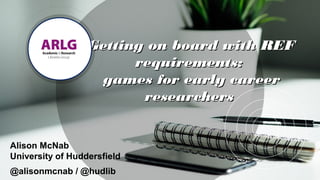Getting on board with REF requirements: games for early career researchers
- 1. Getting on board with REFGetting on board with REF requirements:requirements: games for early careergames for early career researchersresearchers Alison McNab University of Huddersfield @alisonmcnab / @hudlib
- 2. Outline ’┐« Introduction ’┐« Overview of research games, gamification and the Vitae Researcher Development Framework (RDF) ’┐« Mapping games to the RDF ’┐« Mind the (RDF) gaps! ’┐« Feedback from group work ’┐« Conclusion / action planning 2
- 4. 4
- 5. Why play games in HE? ’┐« Research involves play ’┐« An active learning technique ’┐« Provides a range of sensory stimulation to aid memory formation ’┐« Offers a break from screens! ’┐« An opportunity to bring researchers together ’┐« Do you need to give ŌĆ£permission to 5
- 6. Research games See: http ://bit.ly/ResearchGames ’┐«The Game of Open Access ’┐«The Impact Game ’┐«Open Access Escape Room ’┐«The Publishing Trap 6
- 7. Mapping games to the RDF ’┐« Use the Factsheets map the games to the RDF ’┐« How might you incorporate these games in lesson planning at your workplace? 7
- 8. Mind the (RDF) gaps! ’┐« Which RDF sub-domains donŌĆÖt have games or activities mapped to them? ’┐« Does your service offer existing activities / training which might fill the gaps? ’┐« Is there a research game that you might develop? 8
- 10. Further reading ’┐« Sundsb├Ė, K. (2019). Open Access Escape Room: the key to OA engagement?. Insights, 32(1), 8. ’┐« Vitae Vitae Researcher Development Framework ’┐« Walsh, A. (2018) Giving permission to play in Higher Education. In: 4th International Conference on Higher Education Advances. Editorial Universitat Polit├©cnica de Val├©ncia, pp. 329-336. ’┐« Walsh, A. (2018). The librarians' book on teaching through games and play. Tallinn, Harju Maakond: Innovative Libraries. ’┐« Walsh, Andrew (2015) Playful Information Literacy: play and information literacy in Higher Education. Nordic Journal of Information Literacy in Higher Education, 7 (1). pp. 80-94. ’┐« Whitton, N. and Moseley, A. (2019), Playful Learning: events and activities to engage adults, London: Routledge 10
- 11. 11 Thanks! Any questions? You can find me at ’┐«@AlisonMcNab ’┐«A.McNab@hud.ac.uk ’┐«http://bit.ly/Research Games Photo credits: Alison McNab, Chris Morrison & Jane Secker, Laura Palmer, Georgina Parsons and Katrine Sundsb├Ė
- 12. 12 Game of Open Access The Impact Game Open Access Escape Room The Publishing Trap












